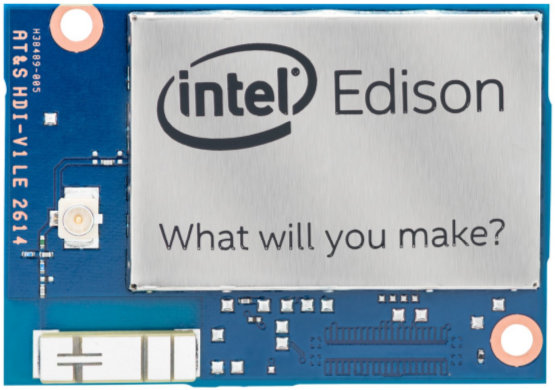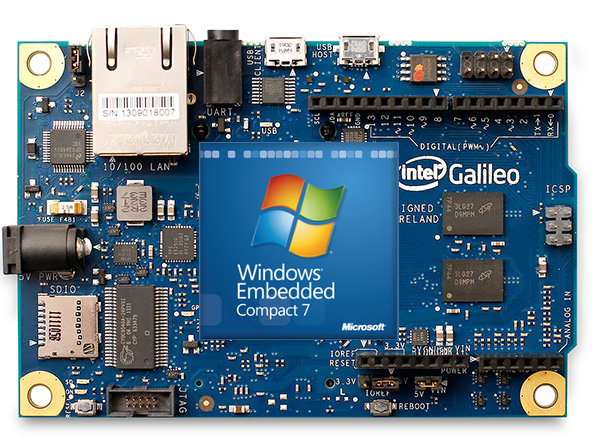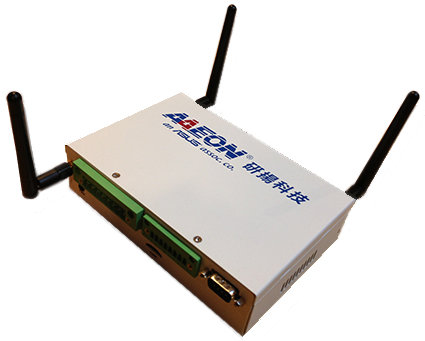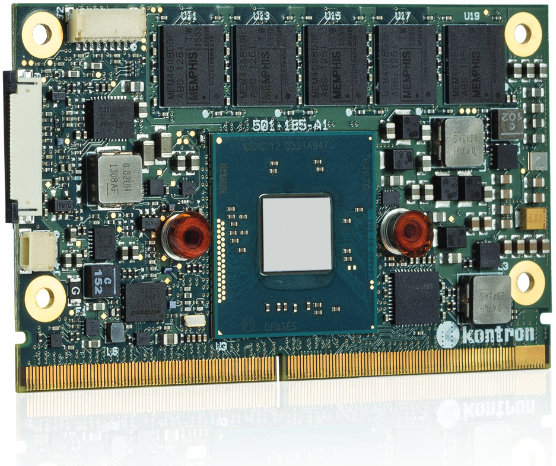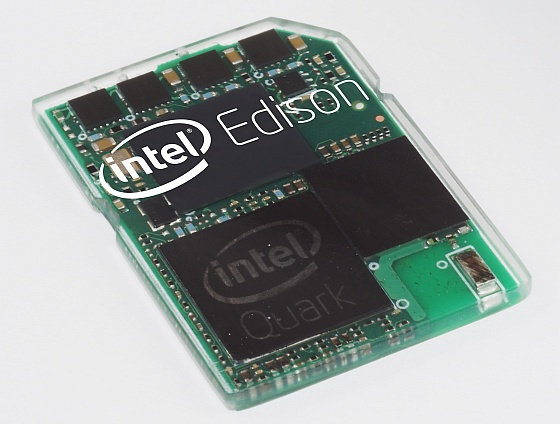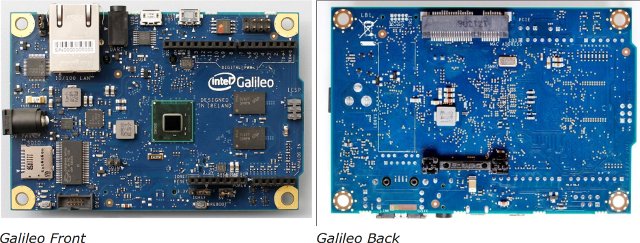Intel announced the Edison board for wearables applications last January at CES 2014. When it first came out, it looked like an SD card, but the board look has now drastically changed. Nevertheless, the important point is that Intel Edison is now available, together with various development kits, and runs Linux (Yocto built), as well as an RTOS. With the official release, we’ve also got the full specifications: SoC – Dual-core, dual-threaded Intel Atom (Silvermont) processor (22nm) processor @ 500 MHz and a 32-bit Intel Quark micro-controller @ 100 MHz. Includes 1GB LPDDR3 PoP memory System Memory – 1 GB LPDDR3 (PoP memory) – 2 channel 32bits @ 800MT/sec Storage – 4 GB eMMC (v4.51 spec) + micro SD card connector Connectivity – Dual band 802.11 a/b/g/n Wi-Fi (Broadcom 43340) with either an on-board antenna or external antenna, and Bluetooth 4.0 USB – 1x micro USB connector I/Os: 2x UART […]
Intel Announces Galileo Gen 2 Development Board Based on Quark SoC
As many of us are waiting for our Intel Galileo board promised by Microsoft, and right after the Raspberry Pi foundation announced the Raspberry Pi Model B+, Intel has introduced a new version of the Galileo board which they simply call Galileo Gen 2. The development board is still powered by Intel Quark single core SoC (Pentium class) and with the same key features as the original Galileo Board, but with some tweaks based on the feedback from the community. Intel Galileo Gen 2 specifications (Changes in Bold): SoC- Intel Quark SoC X1000 single core, single-thread application processor @ 400 MHz, with 12KB embedded SRAM System Memory – 256MB DDR3, 5 Storage – 8MB NOR fklash, 8KB EEPROM, and micro SD card slot (up to 32GB) Connectivity – 10/100M Ethernet USB – 1x USB 2.0 host port, 1x micro USB 2.0 device port used for programming Debugging / Programming 10-pin […]
Microsoft is Giving Away Intel Galileo Arduino Compatible Boards to Developers
Microsoft has already launched several initiatives to reach the maker movement and app developers with .NET Gadgeteer supported by platform like Bambino 200, as well as Intel Shark Cove development board for Windows development. The company has now launched a website called windowsondevices.com where they currently have a signup page for developers to send a kit based on Intel Galileo, an Arduino compatible board powered by Intel Quark processor. There’s currently very little information on the software and documentation part of the development kit, but there are links to Visual Studio Express, Windows Embedded’s Internet of Things page, and a link to Maker Faire, so it gives what the kit will be for. Apparently they’ll send the kit to selected candidate whether “you are an experienced Windows developer looking to jump into the Internet of Things or you are new to Windows development and want to build the next big […]
Aaeon AIOT-X1000 Linux Gateway is Powered by an Intel Quark SoC
Intel Quark SoC for low power embedded devices has been seen on platforms designed by Intel themselves, such as Intel Galileo board or Edison wearable development kit, but I had not found Quark SoC in actual products until Aaeon announced their AIOT-X1000 gateway for the internet of things running Linux on an Intel Quark X1000 SoC, and working with a Cloud Service by Asus, Aaeon’s parent company. The solution targets manufacturing, transportation, and energy applications. Aaeon AIOT-X1000 specifications: Processor – Intel Quark X1000-series SoCs @ up to 400 MHz System Memory – 1GB DDR3 800/1066 SODIMM Storage – IDE port, and micro SD slot Connectivity – 10/100M Ethernet USB 4x USB2.0 ports Serial – 1x RS-232/422/485, 1x RS-422/485 Other I/Os — I2C, GPIO, JTAG Mini-PCIe card expansion – 1x full-size and 1x half-size, allowing for WiFi, 2G/3G/LTE cellular, Bluetooth, CAN bus, ZigBee, and RFID add-on boards Power – 5V or 9-24V DC input Dimensions – 146 x […]
Kontron SMARC-sXBTi is a SMARC Module Powered by Intel Atom E3800 Series SoC
Kontrol has unveiled a computers-on-module based on the SMARC standard, previously ULP-COM, based on Intel Atom E3800 “Bay Trail-I” SoCs with up to 8GB LPDD3 memory, up to 64GB SSD, and support for various interface. After having released SMARC modules based on TI, Freescale and Nvidia last year, the company claims their SMARC-xXBTi is the first ever x86 CoM compatible with SMARC. SMARC-sXBT(i) specifications: SoC – Intel Atom E3800 “Bay Trail-I” with Intel Gen 7 Graphics System Memory – Up to 8GB DDR3L-1067/1333 (1.35V) with optional ECC Storage – 2-32 GB eMMC (SLC), 4-64GB for (MLC), 1x or 2x SATA 3Gb/s, 2x SDIO interfaces Display HDMI 1.4 up to 2560 x 1600 @ 60Hz 18/24-bit single channel LVDS up to 1366 x 768 (Optional eDP to have higher resolutions) Connectivity – Gigabit Ethernet (Intel Springville I210) USB – 1x USB 3.0 (via AFB), 2x USB 2.0, and optional USB OTG. […]
Intel Unveils Edison Board for Wearables at CES 2014 Keynote
After an earlier Intel presentation about Intel RealSense Technology by Mooly Eden, Intel Senior Vice President and General Manager, the newly appointed Intel CEO, Brian Krzanich, officially opened CES 2014 with the pre-show keynote. This time there was nothing about processors for PCs, and the announcement the most interesting and relevant to this blog was Intel Edison, a tiny SD-card sized board powered by a dual core Quark SoC. Specifications: SoC – Unnamed and new dual core Intel Quark SoC @ 400MHz manufactured with 22nm process technology. MCU – Unnamed Intel MCU (MCS 51??) to manage I/Os and other baseline functions. System Memory – LPDDR2 Storage – NAND Flash Connectivity – Wi-Fi and Blutooth 4.0 LE Dimensions – Just like an SD card The board will support Linux, and common open source tools used by the marker community. It will also support Wolfgram language and Mathematica. There will also be […]
$69 Intel Gallileo Development Board Combines x86 Processor and Arduino Compatibility
After UDOO, a Linux development board powered by Freescale i.MX6 ARM Cortex 9 processor and an Atmel SAM3U MCU for Arduino compatibility, here’s another single board computer (SBC) that both runs Linux, and is claimed to be software and hardware compatible with shields designed for Arduino Uno R3: Intel Gallileo. Instead of using two ARM processors, the board is powered by Intel Quark SoC X1000, a 32-bit Pentium class SoC, that handles both Linux and I/Os. Intel Galileo Specifications: SoC – Intel Quark SoC X1000 @ 400MHz with 16 KBytes on-die L1 cache, 512 KBytes of on-die embedded SRAM, single thread, single core, constant speed, ACPI compatible CPU sleep states supported, and integrated Real Time Clock (RTC). Max TDP: 2.2W. System Memory – 256 MByte DRAM Storage – 8 MByte Legacy SPI Flash for bootloader and sketch + 11 KByte EEPROM + optional microSD card (Up to 32GB) Connectors: 10/100 […]


